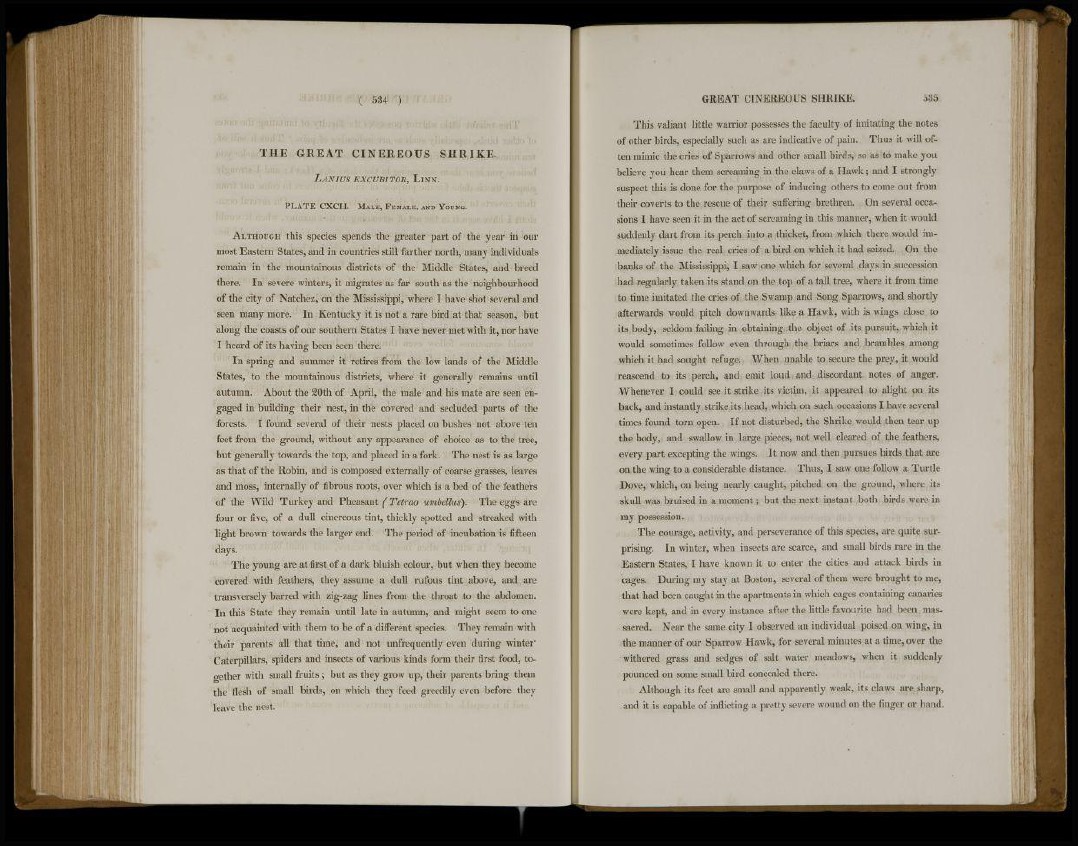
T H E GREAT CINEREOUS SHRIKE.
LANIUS EXCUBITOR, LINN.
P L A T E C X C I I . MALE, FEMALE, AND YOUNG.
ALTHOUGH this species spends the greater part of the year in our
most Eastern States, and in countries still farther north, many individuals
remain in the mountainous districts of the Middle States, and breed
there. In severe winters, it migrates as far south as the neighbourhood
of the city of Natchez, on the Mississippi, where I have shot several and
seen many more. In Kentucky it is not a rare bird at that season, but
along the coasts of our southern States I have never met with it, nor have
I heard of its having been seen there.
In spring and summer it retires from the low lands of the Middle
States, to the mountainous districts, where it generally remains until
autumn. About the 20th of April, the male and his mate are seen engaged
in building their nest, in the covered and secluded parts of the
forests. I found several of their nests placed on bushes not above ten
feet from the ground, without any appearance of choice as to the tree,
but generally towards the top, and placed in a fork. The nest is as large
as that of the Robin, and is composed externally of coarse grasses, leaves
and moss, internally of fibrous roots, over which is a bed of the feathers
of the Wild Turkey and Pheasant (Tetrao umbellus). The eggs are
four or five, of a dull cinereous tint, thickly spotted and streaked with
light brown towards the larger end. The period of incubation is fifteen
days.
The young are at first of a dark bluish colour, but when they become
covered with feathers, they assume a dull rufous tint above, and are
transversely barred with zig-zag lines from the throat to the abdomen.
In this State they remain until late in autumn, and might seem to one
not acquainted with them to be of a different species. They remain with
their parents all that time, and not unfrequently even during winter"
Caterpillars, spiders and insects of various kinds form their first food, together
with small fruits ; but as they grow up, their parents bring them
the flesh of small birds, on which they feed greedily even before they
leave the nest.
This valiant little warrior possesses the faculty of imitating the notes
of other birds, especially such as are indicative of pain. Thus it will often
mimic the cries of Sparrows and other small birds, so as to make you
believe you hear them screaming in the claws of a Hawk; and I strongly
suspect this is done for the purpose of inducing others to come out from
their coverts to the rescue of their suffering brethren. On several occasions
I have seen it in the act of screaming in this manner, when it would
suddenly dart from its perch into a thicket, from which there would immediately
issue the real cries of a bird on which it had seized. On the
banks of the Mississippi, I saw one which for several days in succession
had regularly taken its stand on the top of a tall tree, where it from time
to time imitated the cries of the Swamp and Song Sparrows, and shortly
afterwards would pitch downwards like a Hawk, with is wings close to
its body, seldom failing in obtaining the object of its pursuit, which it
would sometimes follow even through the briars and brambles among
which it had sought refuge. When unable to secure the prey, it would
reascend to its perch, and emit loud and discordant notes of anger.
Whenever I could see it strike its victim, it appeared to alight on its
back, and instantly strike its head, which on such occasions I have several
times found torn open. If not disturbed, the Shrike would then tear up
the body, and swallow in large pieces, not well cleared of the feathers,
every part excepting the wings. It now and then pursues birds that are
on the wing to a considerable distance. Thus, I saw one follow a Turtle
Dove, which, on being nearly caught, pitched on the ground, where its
skull was bruised in a moment; but the next instant both birds were in
my possession.
The courage, activity, and perseverance of this species, are quite surprising.
In winter, when insects are scarce, and small birds rare in the
Eastern States, I have known it to enter the cities and attack birds in
cages. During my stay at Boston, several of them were brought to me,
that had been caught in the apartments in which cages containing canaries
were kept, and in every instance after the little favourite had been massacred.
Near the same city I observed an individual poised on wing, in
the manner of our Sparrow Hawk, for several minutes at a time, over the
withered grass and sedges of salt water meadows, when it suddenly
pounced on some small bird concealed there.
Although its feet are small and apparently weak, its claws are sharp,
and it is capable of inflicting a pretty severe wound on the finger or hand.